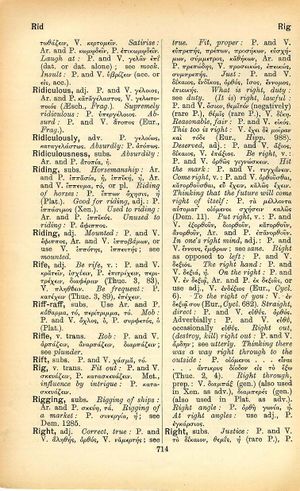ridiculous: Difference between revisions
From LSJ
τὸ βέλτερον κακοῦ καὶ τὸ δίμοιρον αἰνῶ, καὶ δίκᾳ δίκας ἕπεσθαι, ξὺν εὐχαῖς ἐμαῖς, λυτηρίοις μηχαναῖς θεοῦ πάρα → I approve the better kind of evil, the two-thirds kind, and that, in accordance with my prayers, through contrivances bringing salvation at the god’s hand
(Woodhouse 4) |
(CSV4) |
||
| Line 1: | Line 1: | ||
{{ | {{Woodhouse1 | ||
| | |Text=[[File:woodhouse_714.jpg|thumb|link={{filepath:woodhouse_714.jpg}}]]'''adj.''' | ||
P. and V. [[γέλοιος]], Ar. and P. [[καταγέλαστος]], V. [[γελωτοποιός]] (Aesch., <b class="b2">Frag.</b>). | |||
<b class="b2">Supremely ridiculous</b>: P. [[ὑπεργέλοιος]]. | |||
<b class="b2">Absurd</b>: P. and V. [[ἄτοπος]] (Eur., <b class="b2">Frag.</b>). | |||
}} | }} | ||
Revision as of 09:50, 21 July 2017
English > Greek (Woodhouse)
adj.
P. and V. γέλοιος, Ar. and P. καταγέλαστος, V. γελωτοποιός (Aesch., Frag.). Supremely ridiculous: P. ὑπεργέλοιος. Absurd: P. and V. ἄτοπος (Eur., Frag.).

